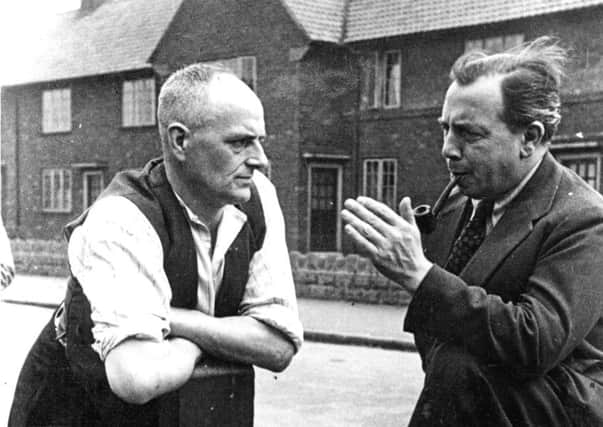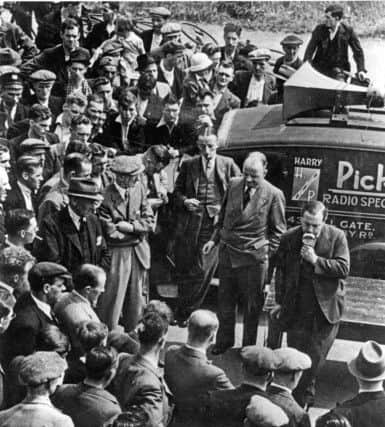JB Priestley: When an inspector called on Yorkshire's mining community


Beginning on June 5 1940, the Yorkshire playwright, author and scriptwriter built up such a following that after a few months it was estimated that around 40 per cent of the adult population in Britain was listening to the programme.
Priestley regarded this as his contribution to the war effort. Having served in the 1914-1918 conflict, he knew of the horrors of war. Taking part in the Battle of Loos in 1917, he was wounded and subsequently endured a German gas attack, before being declared medically unfit for active service.
Advertisement
Hide AdAdvertisement
Hide AdHis Second World War writing and speaking focused largely on the need to sustain morale while beginning to plan for a better life post-war. Fellow writer Graham Greene pointed out: ‘Priestley became in the months after Dunkirk a leader second only in importance to Mr Churchill. And he gave us what our other leaders have always failed to give us – an ideology.’


However, his Postscripts which followed the 9 o’clock news on Sunday nights were not appreciated by those on the Right and were cancelled.
Coupled with Priestley’s broadcasts were his morale-boosting articles which often appeared in Picture Post, a photojournalistic magazine published in the UK between 1938 and 1957. Researching one article, titled This Problem of Coal, Priestley visited Markham Main colliery at Armthorpe in South Yorkshire on Friday, June 20 1941.
The colliery was a late-comer to the buoyant South Yorkshire coalfield. A bore hole was sunk in 1913 but work was postponed because of the First World War. Operations did not start again until 1920 and full production only began in the second half of the decade.
Advertisement
Hide AdAdvertisement
Hide AdPriestley’s visit was organised by Picture Post in conjunction with the Mines Department of the Board of Trade. At Markham, miners worked the celebrated Barnsley seam lying about 730 yards below the flat lands to the east of the River Don.


Looking at the article now it might be regarded as a subtle piece of propaganda. But, if this was so, it was written on Priestley’s own terms. In the piece, Priestley proclaimed the importance of the fuel for the war effort.
‘On the miner’s efforts depended whether the country won – or lost,’ he wrote.
He warned a shortage of fuel for the war factories, or for the power plants feeding the factories, would result in a dwindling supply of munitions. Also, if there was a famine in house coal, there would be more illness, more discomfort and a drop in morale.
Advertisement
Hide AdAdvertisement
Hide AdSaid Priestley: ‘After the collapse of France and the German occupation of the Low Countries, the export market began to shrink rapidly. Coastwise shipping, on which the coal industry had largely depended, soon dwindled and there was much unemployment... But it was quickly discovered we needed all the coal that could be taken out of the ground. The mines, instead of having too many men, had not enough.’
While at Markham, Priestley was determined to discover as much as could about the mining industry at a typical Yorkshire colliery. On arrival, and before visiting the underground workings, he was conducted through Armthorpe village, which contained almost 1,000 colliery houses.
Priestley learned that miners invariably lived in their own little communities not far from the pit heads. It meant they were mostly cut off from the general community and almost formed a kind of small separate nation with its own outlook, habits, customs, sympathies and turns of phrase.
One miner Priestley met had just finished his shift. He had risen that morning at half past four, had gone down and hewn out 10 to 11 tons of coal. His mid-morning snack, or snap, was a slice or two of bread with a scrape of margarine and a slice of lettuce. After a shower at the colliery baths he had gone home to a dinner of fried potatoes and rice pudding. The miner had not eaten meat since the previous weekend.
Advertisement
Hide AdAdvertisement
Hide AdPriestley asked one mother in the village if her young son was to become a miner. ‘It will be all right if he can go to a modern mine such as Armthorpe,’ she replied.
On visiting the home of Mr and Mrs Ralph Bell, the writer was impressed by their young daughter’s impromptu tap dancing performance in the back yard.
Underground, he was photographed riding on the north east man haulage, which took him from the pit bottom to north four junction. At the loading point of conveyor 10, north four district, he talked with the loader lads. These were responsible for loading about 800 tubs a shift, each of 16 cwts capacity.
Priestley spoke to a managing director who complained bitterly about strikes in South Yorkshire. During the previous year they had cost his company some 120,000 tons.
Advertisement
Hide AdAdvertisement
Hide AdPriestley’s reaction was: ‘Clearly this will not do. I do not care whose fault it is but we simply cannot afford such luxuries as strikes and lockouts and all the other antics of industrial disputes at a time when every ton of coal is urgently required.’
After lunch a pit yard meeting was held and J. Hunter, managing director of the Colliery Co., introduced Priestley, who addressed the miners.
H.S. Haslam, agent of the colliery, in his reply, told Priestley: ‘We have at Markham a fine pit and a fine opportunity to save our country by raising the coal so greatly needed. And we have the will to work and achieve our part, however small, to help towards victory in the total war.’
After the war Priestley went on to write some of his noted plays and novels as well as a number of social and political works. He died aged 89 in 1984.
Armthorpe’s Markham Main colliery closed in 1996.